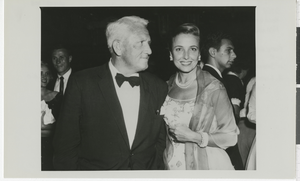Search the Special Collections and Archives Portal
Search Results
Phillip B. McVey oral history interview
Identifier
Abstract
Oral history interview with Phillip B. McVey conducted by Carl Amante in approximately 1976 for the Ralph Roske Oral History Project on Early Las Vegas. In the interview, McVey discusses his ancestors moving to Nevada between 1867 and 1868 and his birth in Eureka, Nevada. McVey describes graduating from the University of Nevada, Reno, working as a land and water surveyor throughout Nevada, and moving to Las Vegas, Nevada in approximately 1960. Other interview topics include visiting the Las Vegas Mormon Fort with Jim Cashman, Sr., public transportation, environmental and noise pollution, and social acceptance toward minorities within Las Vegas.
Archival Collection

Interview with Lafayette "Lafe" H. Dana, June 20, 2005
Date
Archival Collection
Description
Text

Photograph of Spencer Tracy and Laraine Day, Las Vegas (Nev.), 1950s
Date
Archival Collection
Description
Image
Charles Alvin (Todd) Early Jr. oral history interview
Identifier
Abstract
Oral history interview with Charles Alvin (Todd) Early Jr. conducted by Brenda Sue Cody on March 25, 1981 for the Ralph Roske Oral History Project on Early Las Vegas. During the interview, Early discusses mining, the building of Hoover (Boulder) Dam, and train travel being the central mode of transportation in the early days of the region. He also discusses the quick and easy divorce process and gambling as the main tourist attractions in Nevada.
Archival Collection
Ava Carino oral history interview
Identifier
Abstract
Oral history interview with Ava Carino conducted by Isabelle Rice on November 20, 2021 for the Reflections: The Las Vegas Asian American and Pacific Islander Oral History Project. In this interview, Carino recalls their experience as a Filipino American growing up in Las Vegas, Nevada. They discuss working in the gaming industry, past traumatic experiences, and their family's immigration story. Please note the following disclaimer: This interview contains language or content that some may find offensive or triggering. Please contact special.collections@unlv.edu for further information.
Archival Collection
Elwood Schmidt oral history interview
Identifier
Abstract
Oral history interview with Elwood Schmidt conducted by Claytee D. White on and November 14, 2018 for the Boyer Early Las Vegas Oral History Project. In this interview, Schmidt discusses his upbringing and early interest in medicine. He talks about working for the United States Public Health Service, interviewing Emergency Medical Service (EMS) ambulance drivers, and writing
Archival Collection
Robert N. Broadbent oral history interview
Identifier
Abstract
Oral history interview with Robert N. Broadbent conducted by Connie Lyons on September 23, 1972 for the Ralph Roske Oral History Project on Early Las Vegas. During the interview Broadbent discusses education, politics, religion, entertainment, the dedication of Hoover Dam, and the various social clubs of which he is a member of. Broadbent also discusses Six Companies, housing in Boulder City, Nevada, the Las Vegas Strip, Railroad Pass, the Union Pacific Railroad, and the above ground atomic bomb testing in Nevada.
Archival Collection
Mary Ellen Osborn Lake and Thomas Lake oral history interview
Identifier
Abstract
Oral history interview with Mary Ellen Osborn Lake and Thomas Lake conducted by Fred Wilson on February 18, 1951. Mary Ellen discusses arriving in Las Vegas, Nevada in 1904. The Lakes talk about the first Methodist churches in Las Vegas, their involvement, and members of the church community.
Archival Collection
Helen Manix oral history interviews
Identifier
Abstract
Oral history interviews with Helen Manix conducted by Art Rader on October 29, 1974 and November 01, 1974 for the Ralph Roske Oral History Project on Early Las Vegas. In the interviews, Helen Manix discusses moving to Boulder City, Nevada in 1939 with her husband, John Manix, to operate a general merchandise store. Helen Manix and her son, Joseph "Joe" Manix, Jr., also discuss their local community, Boulder (Hoover) Dam, and their experiences in Boulder City during World War II.
Archival Collection
Robert W. Bugbee oral history interview
Identifier
Abstract
Oral history interview with Robert Bugbee conducted by John Lopez on March 16, 1981 for the Ralph Roske Oral History Project on Early Las Vegas. Bugbee discusses his move to Las Vegas, Nevada in 1953 and how both the population and housing have changed since then. Bugbee additionally speaks about the changes in infrastructure, including the building of roads and increased air travel. Throughout the interview, he mentions some of the various specific housing tracts that were built throughout Las Vegas. Bugbee also mentions topics such as the building of Hoover Dam, the first popular casinos in town, the Carole Lombard crash, and the MGM Grand fire. The interview finalizes with Bugbee’s thoughts on the future of Las Vegas.
Archival Collection
